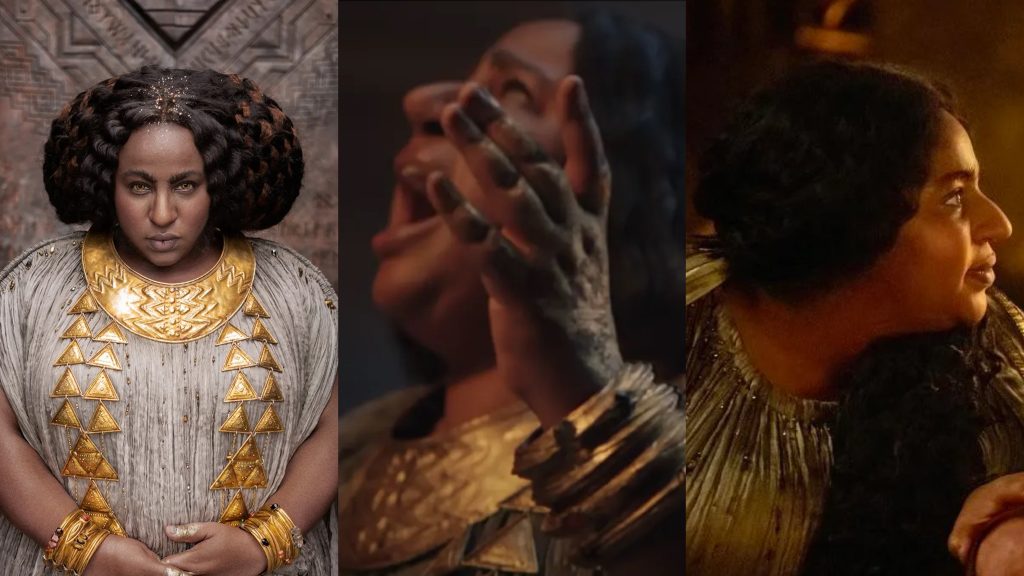Amazon’s The Lord of the Rings: The Rings of Power is one of the most controversial TV shows ever made—and it has not even aired yet. While the prospect of delving back into Middle-earth is exciting, adapting Tolkien’s First and Second Age material has always been subject to debate and skepticism among fans, with many arguing that a screen adaptation of The Silmarillion would be downright impossible. Unfortunately, the little we know about the series so far has fallen short of most fans’ expectations, with each promotional release being subject to scrutiny, backlash, and even ridicule. For years, information about The Rings of Power has been scarce and vague. Yet even now that we are getting trailers and promotional photos, Amazon’s continued lack of transparency, which has driven a wedge between the creators and the fans, might prove to be their most glaring mistake.
The series, which takes place during the Second Age, will follow Sauron’s ascension to power and the forging of the Rings of Power. It would be impossible for anyone to tell this story without adding inventions of their own since few details are known about this period. Amazon’s true challenge lies in creating a story that expands upon Tolkien’s world without contradicting the foundation he established. Showrunners JD Payne and Patrick McKay, who claim to be lifelong admirers of Tolkien, stated in an interview with Empire that “we’re doing what Tolkien wanted. As long as we felt like every invention of ours was true to his essence, we knew we were on the right track.”
Unfortunately, most fans disagree. Between short haired-elves, beardless dwarf women, and time compression, Amazon has made a panoply of decisions deemed highly questionable by the fandom. The problem, however, is not necessarily these interpretive choices themselves but what they represent: Amazon does not respect fan expectations and interpretations. Because Tolkien wrote multiple versions of his tales and sometimes changed his mind about details of his lore, what is and is not considered canon is highly contested. Fan interpretations, on the other hand, are somewhat more stable.
Take, for example, dwarf women—do they have beards or not? Tolkien mentions a few times that they do have beards, but in The Nature of Middle Earth, a collection of Tolkien’s final writings published in 2021, it is said that only male dwarves have beards. Although this may have been Tolkien’s last word on the subject, fans have long believed that dwarf women have beards, and we have become attached to that detail.
When Amazon chooses to portray dwarf women without beards, they aren’t technically going against Tolkien’s word, but they are going against recognized and established interpretations within the fandom. And this is but one example of the many decisions taken by Amazon that antagonize long-time fans. Portraying elves with long hair is another practice that, even long before Peter Jackson’s adaptations, was a distinctive feature of Tolkien’s elves, supported by fanart and Tolkien’s own writing and drawings, no less. This iconography has also been present in the work of respected Tolkien artists for decades. Such details that might seem trivial to general audiences have canonical importance for the fandom, and to see them portrayed differently is disconcerting. All of Amazon’s creative choices that deviate from dominant interpretations create a story and a world that, although we know is meant to be Middle-earth, is not our Middle-earth.
Fans are not merely consumers; we are custodians whose passion and commitment to writing articles and creating fanfiction, fanart, and cosplays allows stories to exist beyond themselves. Ultimately, the fans hold the power to ensure a franchise’s longevity. That is why our opinions matter. Peter Jackson knew this. In an oft-quoted interview with The Guardian published in 1999, he discussed how important the opinions of fans were to him, stating that he would spend hours reading about people’s concerns about his adaptation. Over a decade later, in the run-up to the release of The Hobbit: An Unexpected Journey, Jackson took full advantage of the growing presence of social media and posted several production diaries. These videos provided an in-depth look behind the scenes of the movies and made fans feel like they were part of the process of bringing Tolkien’s work to the big screen. Significantly, these videos also reveal how much love and dedication went into making these movies. Regardless of how one feels about some of their interpretive choices, it is undeniable that Jackson and his team cared about the fans and Tolkien equally.
In contrast, Amazon has been relatively quiet—even secretive—up until a few weeks ago, revealing very little about the show. Apart from a few vague and scattered quotes in interviews, we have been given very little insight into Payne and McKay’s creative process. Although they are aware of some of the fandom’s concerns, they have been telling us that we should simply trust them, rather than giving us a reason to believe in them. In early May, a group of Tolkien fans and scholars, including Shaun Gunner, the chair of Tolkien Society, had the privilege of viewing some footage from the show and speaking with the showrunners. Though their response had been surprisingly positive, it’s disappointing that only an exclusive group of people were given this opportunity when the whole fandom deserves to have such a relationship with the creators. We all deserve to know that the stories and characters we love so dearly are in good hands.
All of Amazon’s creative choices that deviate from dominant interpretations create a story and a world that, although we know is meant to be Middle-earth, is not our Middle-earth.
Fans had high expectations, then, for the show’s panel at this year’s San Diego Comic-Con, which took place on Friday. Attendees eagerly and anxiously anticipated a new trailer and insights from the creative team behind the show. Unfortunately, while we did get to hear from the cast and crew, the showrunners’ comments were mostly cursory and unsatisfactory defences of their more controversial interpretive choices. For example, when asked by host Stephen Colbert why their Elves have short hair, McKay dismissively replied that “Elves don’t look the same all the time,” showing once again a lack of consideration for fan expectations and preferences. On the question of the beardless dwarf women, producer Lindsey Weber remarked that “I can confirm they have facial hair, I can’t wait for you to see more of it, you see more of it in the show,” but the images of the one dwarf woman we have seen so far contradict this (tiny sideburns is not a beard!). However, it was refreshing to see that many of the cast members were genuinely enthusiastic and knowledgeable about their characters and the lore during the post-panel live-streamed Q&As. These interviews were very short, but they nonetheless provided a wonderful glimpse into the camaraderie the actors share, as well as the respect and duty they feel towards fans to create an adaptation that honours Tolkien’s legacy.

Sophia Nomvete as Princess Disa © Amazon Prime
Despite how Amazon purports to celebrate Tolkien’s unique vision, their approach noticeably simplifies his creations to appeal to more generic and conservative fantasy aesthetics. The short-haired male elves have lost the elegant androgyny of previous incarnations, and dwarf women are feminized. Galadriel is remarketed as a female warrior archetype. These reductive interpretations may also reveal that Amazon’s real agenda has little to do with passion and everything to do with economics. The company has bet so much on The Rings of Power succeeding not because they care about bringing Tolkien’s work onscreen, but because this could be the popular TV that upturns their controversial reputation and brings an indispensable asset to their growing streaming service. The fact that Amazon has deliberately contorted Tolkien’s work into a “safe” product to be marketing globally should thus raise a question in even the show’s most optimistic supporters: who is The Rings of Power’s true intended audience, if it isn’t the Tolkien fans who have been dreaming of such an adaptation for years, and even decades?
Though there is no way to truly tell how The Rings of Power will fare with audiences until September, the way Amazon and the showrunners have consistently dismissed or neglected the justified concern of fans is worrying, to say the least. Considering the precedent left by Jackson and his team, Amazon’s obvious disinterest in sustaining any healthy dialogue with fans leaves us feeling disappointed and disheartened. Tolkien’s legacy rests upon the support of fans who have spent decades poring over his words, studying them, growing with them, and being inspired by them to the point of establishing Tolkien and his legendarium as the pinnacle of the fantasy genre. Such dedication and love cannot be easily replicated—even with a one billion dollar check from Amazon.
Follow us for more articles on The Rings of Power and weekly reviews of the series starting September 2nd.





Quel article excellent autant en ce qui concerne la qualité de la recherche qu’en ce qui a trait à l’exécution stylistique.
Je suis d’accord avec cette analyse très apte qui prend en compte divers aspects de la problématique et les traite avec une maturité scientifique et par le biais d’un esprit ouvert exceptionnel.
Il serait trop facile de tout condamner dorénavant et de tomber dans un fatalisme simpliste, voilà pourquoi je me réjouis de trouver des réflexions approfondies comme celle-ci. Espérons donc que le manque d’informations ne fait que dissimuler une série extraordinaire qui saura satisfaire et divertir même les plus assidus des fans.
Toutes mes félicitations pour cet écrit merveilleux qui résume bien les peurs et soucis de lecteurs un peu partout – attachés au monde et aux oeuvres de Tolkien à des degrés très divers – et nous donne le sentiment d’être un peu moins démunis face à un pouvoir qui ne semble pas nous écouter.